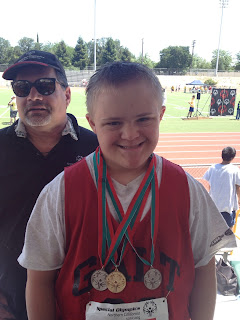Interesting................
Down Syndrome Neurons Show Synaptic Deficit
Tue, 2013-05-28 10:46
Be gentle.
 Karyotype of 21 trisomy (Down syndrome).Down syndrome, the most common genetic form of intellectual disability, results from an extra copy of one chromosome. Although people with Down syndrome experience intellectual difficulties and other problems, scientists have had trouble identifying why that extra chromosome causes such widespread effects.
Karyotype of 21 trisomy (Down syndrome).Down syndrome, the most common genetic form of intellectual disability, results from an extra copy of one chromosome. Although people with Down syndrome experience intellectual difficulties and other problems, scientists have had trouble identifying why that extra chromosome causes such widespread effects.
In new research published this week, Anita Bhattacharyya, a neuroscientist at the Waisman Center at UW-Madison, reports on brain cells that were grown from skin cells of individuals with Down syndrome.
"Even though Down syndrome is very common, it's surprising how little we know about what goes wrong in the brain," says Bhattacharyya. "These new cells provide a way to look at early brain development."
The study began when those skin cells were transformed into induced pluripotent stem cells, which can be grown into any type of specialized cell. Bhattacharyya's lab, working with Su-Chun Zhang and Jason Weick, then grew those stem cells into brain cells that could be studied in the lab.
One significant finding was a reduction in connections among the neurons, Bhattacharyya says. "They communicate less, are quieter. This is new, but it fits with what little we know about the Down syndrome brain." Brain cells communicate through connections called synapses, and the Down neurons had only about 60 percent of the usual number of synapses and synaptic activity. "This is enough to make a difference," says Bhattacharyya. "Even if they recovered these synapses later on, you have missed this critical window of time during early development."
The researchers looked at genes that were affected in the Down syndrome stem cells and neurons, and found that genes on the extra chromosome were increased 150 percent, consistent with the contribution of the extra chromosome.
However, the output of about 1,500 genes elsewhere in the genome was strongly affected. "It's not surprising to see changes, but the genes that changed were surprising," says Bhattacharyya. The predominant increase was seen in genes that respond to oxidative stress, which occurs when molecular fragments called free radicals damage a wide variety of tissues.
"We definitely found a high level of oxidative stress in the Down syndrome neurons," says Bhattacharyya. "This has been suggested before from other studies, but we were pleased to find more evidence for that. We now have a system we can manipulate to study the effects of oxidative stress and possibly prevent them."
Down syndrome includes a range of symptoms that could result from oxidative stress, Bhattacharyya says, including accelerated aging. "In their 40s, Down syndrome individuals age very quickly. They suddenly get gray hair; their skin wrinkles, there is rapid aging in many organs, and a quick appearance of Alzheimer's disease. Many of these processes may be due to increased oxidative stress, but it remains to be directly tested."
Oxidative stress could be especially significant, because it appears right from the start in the stem cells. "This suggests that these cells go through their whole life with oxidative stress," Bhattacharyya adds, "and that might contribute to the death of neurons later on, or increase susceptibility to Alzheimer's."
Other researchers have created neurons with Down syndrome from induced pluripotent stem cells, Bhattacharyya notes. "However, we are the first to report this synaptic deficit, and to report the effects on genes on other chromosomes in neurons. We are also the first to use stem cells from the same person that either had or lacked the extra chromosome. This allowed us to look at the difference just caused by extra chromosome, not due to the genetic difference among people."
The research, published in the Proceedings of the National Academy of Sciences, was a basic exploration of the roots of Down syndrome. Bhattacharyya says that while she did not intend to explore treatments in the short term, "we could potentially use these cells to test or intelligently design drugs to target symptoms of Down syndrome."



























